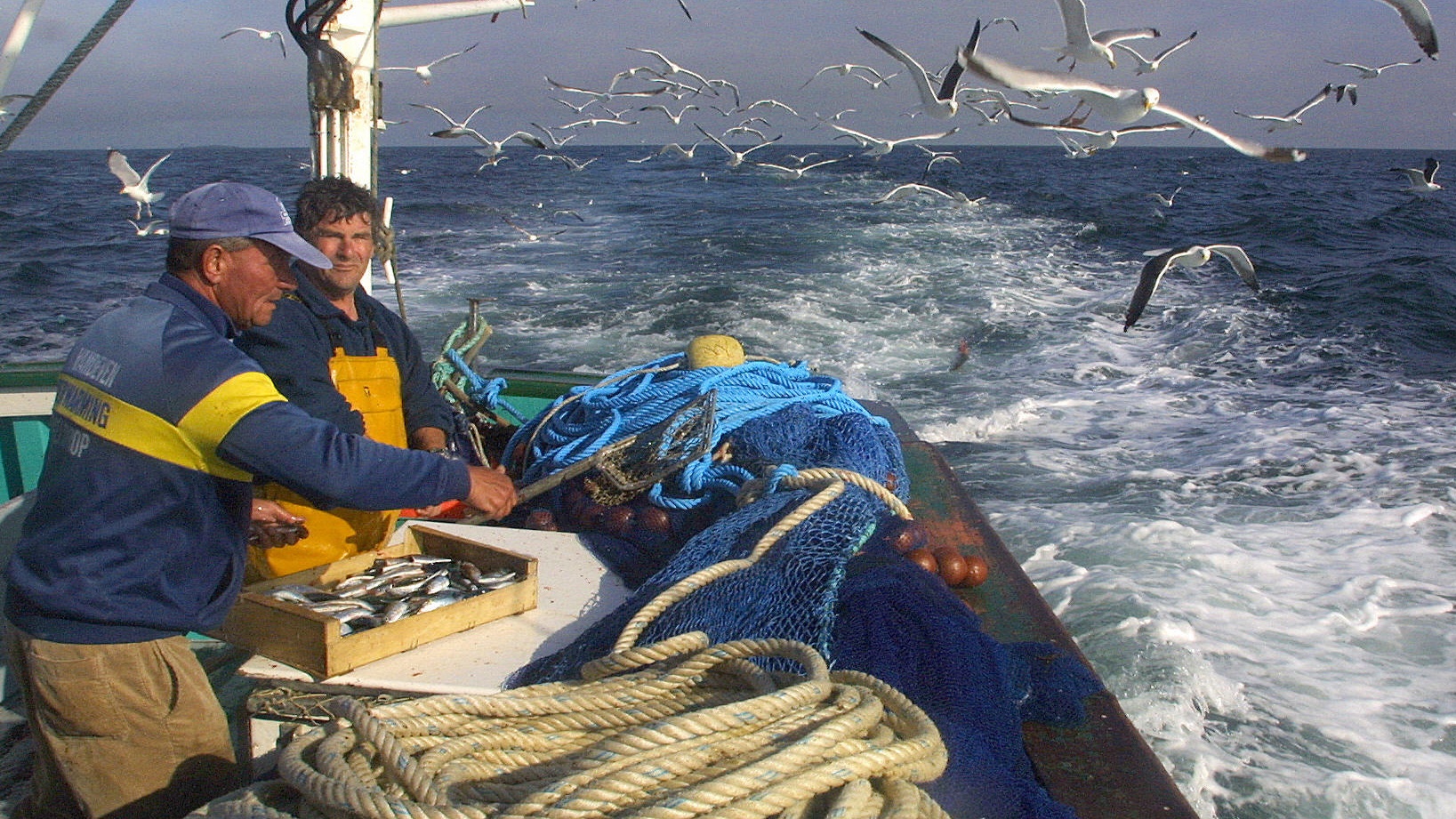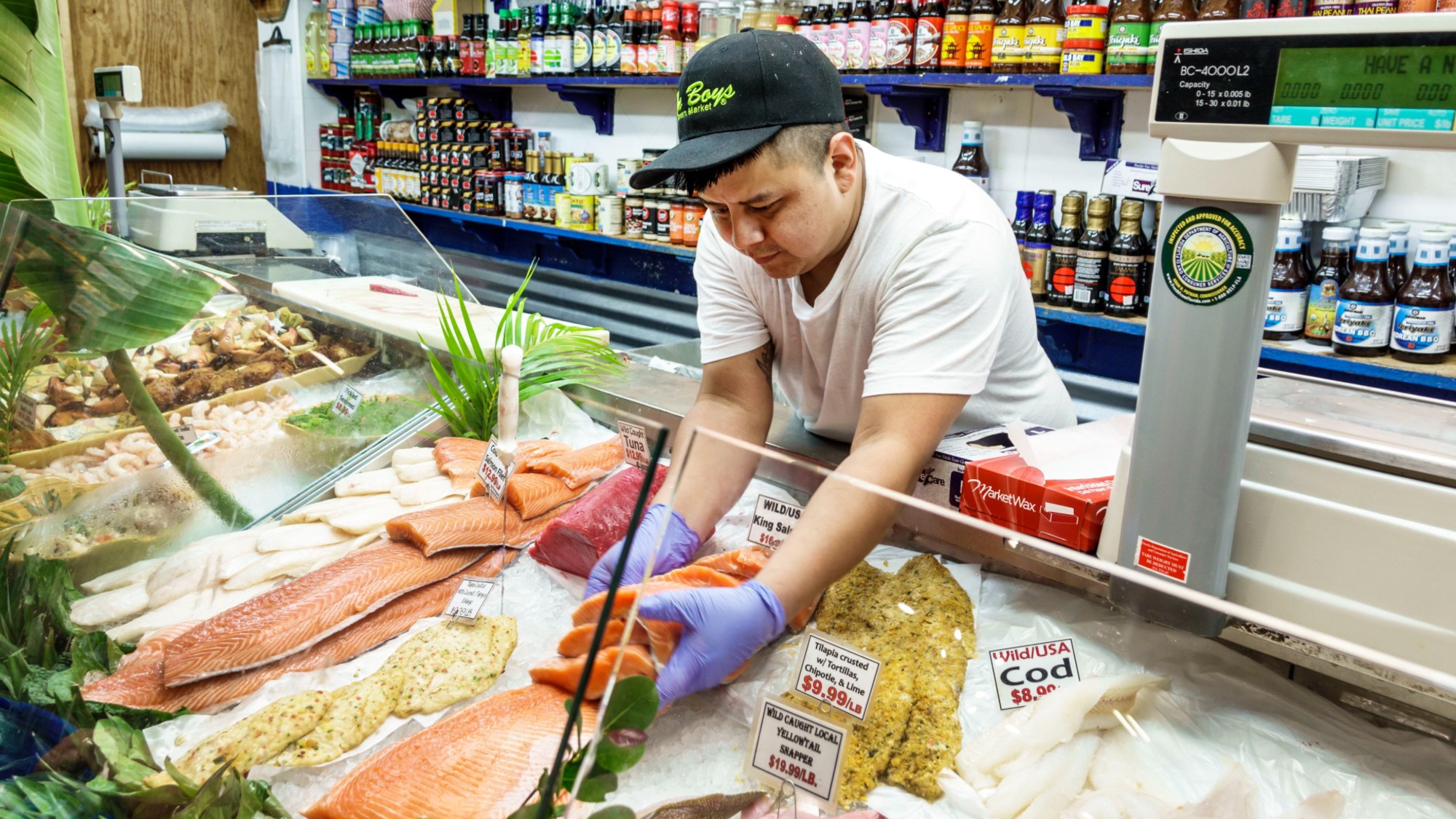The war plan for post-Brexit fish fight with France
Award licences to skippers not boats to unlock talks, French officials say

A free daily email with the biggest news stories of the day – and the best features from TheWeek.com
You are now subscribed
Your newsletter sign-up was successful
Anglo-French relations have historically been famously fraught but Brexit has ignited a new front in the age-old rivalry, namely the so-called “fishing wars”.
Sparked by a dispute over the number of licences granted to French fishing vessels since the UK left the EU, the dispute has at times threatened to “tip into a full-blown trade war”, The Guardian said.
But ongoing talks have so far managed to delay threats from Paris to impose retaliatory sanctions against the UK on seafood imports.
The Week
Escape your echo chamber. Get the facts behind the news, plus analysis from multiple perspectives.

Sign up for The Week's Free Newsletters
From our morning news briefing to a weekly Good News Newsletter, get the best of The Week delivered directly to your inbox.
From our morning news briefing to a weekly Good News Newsletter, get the best of The Week delivered directly to your inbox.
The seizure of a British trawler in French waters in late October marked a new escalation in the two countries’ battle over post-Brexit fishing rights.
The boat was detained by authorities off Le Havre as France “pledged to ban all British seafood imports” immediately if the UK failed to meet a 1 November deadline to rethink the “decision not to grant more fishing licences to French trawlers”, The Times said.
1. Dressing down
The detainment of the British trawler has already triggered what The Sun described as “an astonishing slanging match” between London and Paris.
France’s Europe Minister Clement Beaune told reporters that Paris needs to “speak the language of force because, unfortunately, that seems to be the only thing this British government understands”.
A free daily email with the biggest news stories of the day – and the best features from TheWeek.com
Boris Johnson responded by saying that France’s actions are “simply not what we expect from a close ally and partner”.
The French ambassador in London was summoned to the Foreign Office for a formal rebuke yesterday, a move that BBC diplomatic correspondent James Landale said “is not something allies do very often”.
“This form of diplomatic dressing down is normally reserved for governments with whom the UK has a less amicable relationship, such as China or Iran, he added.
Environment Secretary George Eustice has suggested that Johnson could “have an opportunity to meet Macron” to discuss the fishing row at Cop26, which kicks off in Glasgow on Sunday. Eustice told Sky News that “we want to defuse this issue but the truth is, we haven’t done anything wrong”.
France was unlikely to enforce any reactive measures “until Tuesday probably at the earliest”, he predicted, adding: ”If they do bring these into place, well, two can play at that game and we reserve the ability to respond in a proportionate way.”
2. Tit-for-tat sanctions
If a bilateral meeting between Johnson and Macron does not lead to a breakthrough, the two nations may resort to sanctions.
“Tit-for-tat measures” seem “inevitable”, The Guardian said. Following the trawler seizure, Britain could “respond with proportionate sanctions on the French”, including “potential blockades by French fishers of British and Jersey ports”, the paper suggested.
The UK has also “begun preparations for a major clash with the European Union by triggering Article 16″, Sky News said.
The measure allows London to stop following some parts of the Northern Ireland Protocol if it is causing serious ”economic, societal or environmental difficulties“.
“Amid deteriorating relations”, the issue of “Article 16 readiness” is back on the agenda within the government, the broadcaster reported.
Britain is also preparing to “ratchet up” diplomatic pressure on Paris, said The Telegraph. And the row could have wider implications if allies are forced to choose sides, with the European Commission “yet to back France’s call for action”, the Financial Times added.
3. In the dock
Back in May, the UK deployed two Royal Navy gunboats to Jersey amid concerns of a possible blockade of the island by French boats.
Some commentators have speculated that such a move could be repeated. But Sky News said that No. 10 has “no plans” to send the Royal Navy back to protect British vessels in the Channel.
Brexit negotiator David Frost is meeting European Commission vice-president Maros Sefcovic today to discuss the Northern Ireland Protocol, amid a separate row about the role the Court of Justice of the European Union in managing the accord.
According to Politico’s Alex Wickham, “it’s inevitable that the French fishing row will come up” at the meeting.
New Statesman political editor Stephen Bush said that the fish fight could yet be resolved by more diplomatic measures, if London decides that “an officious response to ageing French fishing vessels” is not “really worth the candle”.
“It’s easy to forget because relations between the two governments are so bad, but France and the United Kingdom retain considerable shared strategic interests and important areas of mutual cooperation,” he added.
4. ‘O Captain! My Captain!’
France has suggested that the UK could hand licences to “skippers, not boats” as the “price for ending” the dispute over the number of licences granted to small French fishing vessels since the UK left the EU, reported The Telegraph.
“Both sides remained deadlocked over the issue,” the paper added. However, Paris now “believes that fishermen have been denied licences despite having a history of fishing British waters, because they have recently changed boats”.
Speaking after a meeting with Brexit Minister Lord Frost this week, France’s Europe Minister Claude Beaune said that the Brexit withdrawal agreement clearly stated that “there could be boats that had fished in recent years in British waters and have been replaced, as it happens in the fishing sector that there is a change of ownership.
“We are in disagreement over what ‘replacement’ means in the agreement. The British have added criteria on ownership that were not in the original agreement,” he added.
“We are asking for a return to the agreement, namely to maintain the fishing volume capacity and not demand continuity in fishing boat ownership.”
-
 6 exquisite homes with vast acreage
6 exquisite homes with vast acreageFeature Featuring an off-the-grid contemporary home in New Mexico and lakefront farmhouse in Massachusetts
-
 Film reviews: ‘Wuthering Heights,’ ‘Good Luck, Have Fun, Don’t Die,’ and ‘Sirat’
Film reviews: ‘Wuthering Heights,’ ‘Good Luck, Have Fun, Don’t Die,’ and ‘Sirat’Feature An inconvenient love torments a would-be couple, a gonzo time traveler seeks to save humanity from AI, and a father’s desperate search goes deeply sideways
-
 Political cartoons for February 16
Political cartoons for February 16Cartoons Monday’s political cartoons include President's Day, a valentine from the Epstein files, and more
-
 How corrupt is the UK?
How corrupt is the UK?The Explainer Decline in standards ‘risks becoming a defining feature of our political culture’ as Britain falls to lowest ever score on global index
-
 Le Pen back in the dock: the trial that’s shaking France
Le Pen back in the dock: the trial that’s shaking FranceIn the Spotlight Appealing her four-year conviction for embezzlement, the Rassemblement National leader faces an uncertain political future, whatever the result
-
 The high street: Britain’s next political battleground?
The high street: Britain’s next political battleground?In the Spotlight Mass closure of shops and influx of organised crime are fuelling voter anger, and offer an opening for Reform UK
-
 Biggest political break-ups and make-ups of 2025
Biggest political break-ups and make-ups of 2025The Explainer From Trump and Musk to the UK and the EU, Christmas wouldn’t be Christmas without a round-up of the year’s relationship drama
-
 ‘The menu’s other highlights smack of the surreal’
‘The menu’s other highlights smack of the surreal’Instant Opinion Opinion, comment and editorials of the day
-
 Is a Reform-Tory pact becoming more likely?
Is a Reform-Tory pact becoming more likely?Today’s Big Question Nigel Farage’s party is ahead in the polls but still falls well short of a Commons majority, while Conservatives are still losing MPs to Reform
-
 ‘Latinos bring a wealth of knowledge and cultural connection to the ocean’
‘Latinos bring a wealth of knowledge and cultural connection to the ocean’Instant Opinion Opinion, comment and editorials of the day
-
 France targets Shein over weapons, sex dolls
France targets Shein over weapons, sex dollsSpeed Read Shein was given 48 hours to scrub the items from their website